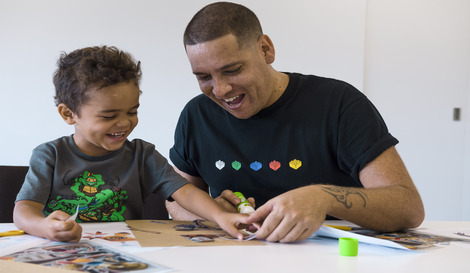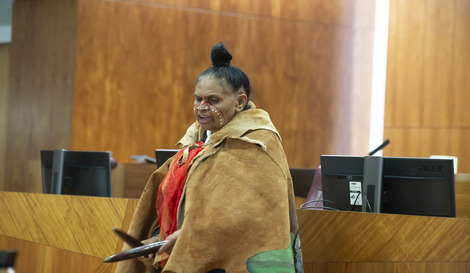Analysing the development and implementation of public policy
This Program seeks to understand the relationship between the processes involved in developing and implementing public policies, and the outcomes that policies generate; and use this understanding to improve public policy outcomes.
It is concerned with the design of policies, including the role of expert advice and of public consultation in policy formulation; the way in which policies are implemented and barriers to effective implementation; evaluation of policy outcomes; and understanding the causal links between policy design, implementation, and outcomes.
The program investigates a range of policy areas and issues, including natural resource management; environmental politics, climate change and sustainability; social policy and inequality; the role of statistics and statistical agencies in policy making; and Indigenous policy (so linking to the Centre’s Program on Indigenous Politics). It frequently employs a comparative focus and operates across a range of geographies, including Australia, Canada, Chile, China, Russia and Papua New Guinea.
The program advises governments, law and policy makers, community, Indigenous and civil society organisations and other stakeholders through policy guidance, evidence, information and resources, research collaboration, and supporting or contributing to advisory committees through our experts.
Program Leaders: Associate Professor Cosmo Howard; Dr Ellie Martus; Emeritus Professor Ciaran O’Faircheallaigh
Sustainable Development Goals
The Centre for Governance and Public Policy is aligned with the United Nation's Sustainable Development Goals (SDGs), and committed to tackling global challenges around peace, justice and strong institutions and partnerships for goals.
Sustainable Development Goals
Griffith University is aligned to the United Nation's Sustainable Development Goals (SDGs) and committed to tackling global challenges around peace, justice and strong institutions and partnerships for goals.
Our team
Julie Ballangarry
Indigenous affairs, public policy, black politics, and popular culture and politics
Associate Professor Cosmo Howard
Inequality and public policy, The politics of expertise, Comparative public administration
Professor Shireenjit Johl
Audit market, Earnings quality and earnings management, Corporate governance, Voluntary disclosure
Dr Ellie Martus
Public policy, Russian politics, Environmental politics and policy, Industry and climate politics
Professor Ciaran O’Faircheallaigh
Resource development and indigenous peoples, policy evaluation, negotiation and social impact assessment.
Joe Stella
Federalism and subsidiarity, decentralisation and regional development, and indigenous self-determination
Professor Emeritus Patrick Weller
Executive government, politics and policymaking in central governments in Westminster systems, Australian politics, international civil servants
Andrew R Wills
Leadership in public contexts, innovation and bureaucracy, public sector reform
Professor Xu Yi-chong
Energy security, international organisations, China, regional studies
OUR HIGHLIGHTS
Indigenous Peoples and Mining
In this book, CGPP member Emeritus Professor Ciaran O’Faircheallaigh draws on his 30 years of work with Indigenous People and Mining. He seeks to understand the political, social, economic, and cultural dynamic that is created by the relentless expansion of mining into
indigenous territories. Considering that Indigenous peoples embody a large part of the world’s linguistic and cultural diversity, their lands cover an estimated 25 per cent of the world’s land surface, intersect with about 40 per cent of all
ecologically intact landscapes, and contain a large proportion of the world’s mineral resources, this book makes a significant contribution to our knowledge in this area.

The potential impact on Indigenous peoples
Ciaran examines Climate Change and a Just Transition, in a presentation to the Centre for Aboriginal Economic Policy Research on Transition Minerals. Ciaran considers the potential impact on Indigenous peoples of the massive increase in production of critical and energy transition minerals (including lithium, cobalt, copper, nickel and rare earths) which must occur to allow production of huge numbers of solar panels, wind turbines, electric cars and batteries.

Insights into Indigenous perspectives
Bringing together Indigenous people's representatives from Bolivia, the United States, Russia and Brazil, Ciaran participated with Indigenous organisations in a webinar organised by Cultural Survival providing expert advice to members of the European Parliament to support recognition of Indigenous rights in European Union legislation dealing with Transition Minerals. Ciaran has been lobbying European Parliament members to include recognition of Indigenous rights in the European Union's Critical Raw Materials Act. The webinar offers insights into Indigenous perspectives on the energy transition and on why the recognition of Indigenous rights is essential for Europe's pursuit of environmental and social sustainability.

Understanding the Antipodean ‘Fair Go’
The 'fair go' is a recurring theme in Australia and New Zealand, but what does it actually mean to Australians, New Zealanders and their elected representatives? Has the meaning of the fair go changed throughout history? How has the fair go idea shaped public policy?
In 2022, Associate Professor Cosmo Howard, Professor Juliet Pietsch and Professor Jennifer Curtin (University of Auckland) were awarded an ARC Discovery Project grant to examine what a ‘fair go’ means to Australians and New Zealanders and provide expert advice to policymakers and governments so that they can better understand citizens’ values and build knowledge about how values and ideas shape public policies.
This project generates new knowledge about the role of the fair go in political debate and policy making. It examines the values that have been historically connected to the fair go. It assesses how the public and politicians understand the fair go and investigates how the fair go has influenced public policies.
Given the pervasiveness of the fair go in Antipodean political and social discourse, this project helps clarify key values that make up our culture and identity.

Environmental politics under authoritarian rule
Dr Ellie Martus, Centre for Governance and Public Policy Griffith University, and Associate Professor Fengshi Wu, University of New South Wales, co-convened an international conference in December 2022 to explore issues related to the politics of the environment under authoritarian states at a time when transboundary ecological challenges and climate change are at the top of state policy agendas. The conference was funded by the Australian Political Studies Association (APSA), Griffith University and the University of New South Wales. Keynote speakers at the conference were Professor David Sonnenfeld, State University of New York (SUNY) and Professor Robyn Eckersley from the University of Melbourne.
Topics of discussion included civil society engagement and advocacy in authoritarian settings, the potential impacts of different governance arrangements on environmental outcomes, the connection between authoritarianism, populism, and the environment, and whether addressing climate change could lead to political destabilisation and the rise of illiberal politics. The conference raised issues and themes around environmental governance and power contestation between states and social forces that will frame the future research collaboration between academics and practitioners.

Government Statistical Agencies
Dr Cosmo Howard has authored the book 'Government Statistical Agencies and the Politics of Credibility. He asks who decides how official statistics are produced? Do politicians have control or are key decisions left to statisticians in independent statistical agencies? Interviews with statisticians in Australia, Canada, Sweden, the UK and the USA were conducted to get insider perspectives on the nature of decision making in government statistical administration. While the popular adage suggests there are 'lies, damned lies and statistics', this research shows that official statistics in liberal democracies are far from mistruths; they are consistently insulated from direct political interference. Yet, a range of subtle pressures and tensions exist that governments and statisticians must manage. The power over statistics is distributed differently in different countries, and this book explains why. Differences in decision-making powers across countries are the result of shifting pressures politicians and statisticians face to be credible, and the different national contexts that provide distinctive institutional settings for the production of government numbers.

The politics of expertise during COVID-19
Professor Sara Davies, Associate Professor Cosmo Howard and Dr Jessica Kirk with colleagues were awarded an ARC grant (2022-2025) to examine the politics of expertise during COVID-19.
COVID-19 has highlighted the extraordinary costs of pandemics for public health, domestic economies, international trade, travel and public trust in institutions. Experts plays a crucial role during crises. The politics of expertise during COVID-19 Australian Research Council Discovery Project will examine how four governments, Australia, Sweden, United Kingdom and United States, incorporated public health expertise into their decision-making during the COVID-19 pandemic. These countries have similar economic resources, liberal democratic institutions, health system capacities and pandemic preparedness. Yet, their governments responded differently to COVID-19.

Leading from Between
A comparative study of Indigenous public servants in British Columbia and Queensland, Leading from Between addresses critical concerns about leadership, difference, and public service. Centring the voices, personal experiences, and understandings of Indigenous public servants, this book uses their stories and testimony to explore how Indigenous participation and leadership change the way policies are made. Articulating a new understanding of leadership and what it could mean in contemporary public service, Catherine Althaus and Ciaran O'Faircheallaigh challenge the public service sector to work towards a more personalized and responsive bureaucracy.
At a time when Canada and Australia seek to advance reconciliation and self-determination agendas, Leading from Between shows how public servants who straddle the worlds of Western bureaucracy and Indigenous communities are key to helping governments meet the opportunities and challenges of growing diversity.

Julie Ballangarry speaks about inclusive education
Julie Ballangarry (with fellow Griffith University researcher Nina Ginsberg) recorded The Gender Card podcast to celebrate International Women's Day 2021. Julie shares her thoughts and insights on Inclusive education: What is it and how can we help women around the world break down the barriers to full inclusion in school.
This episode of The Gender Card podcast talks to Julie and Nina who are doing groundbreaking research into the way we think about education and education policy. Julie's research explores why Indigenous education policies are continually failing by investigating the current approaches to policy-making in this arena. Nina explores how bicycles can enable or constrain rural African girls' access to secondary school. She manages a popular blog called 'Bicycles Create Change’. Nina is finding through her fieldwork that sometimes the most simple out of school solutions like bikes as transportation are key to overcoming gender discrimination and improving access to essential services.
OTHER PUBLICATIONS
Cosmo Howard | State Formation and Statistics | Handbook on Measuring Governance | 2024
Cosmo Howard, Pandanus Petter | Queensland | , in M. Evans, P. Dunleavy and J. Phillimore (eds.) Australia’s Evolving Democracy – the 2024 Australian Democratic Audit | 2024
Cosmo Howard | Performing the Policy Cycle | Policy as Practice: Making Sense of Governing | 2023 Cosmo Howard | What did a ‘fair go’ originally mean to Australians? | Australian Journal of Political Science | January 2023
Cosmo Howard | What did a ‘fair go’ originally mean to Australians? | Australian Journal of Political Science | January 2023
Cosmo Howard, Bernadette Hyland-Wood | The promise and performance of data ecosystems: Australia's COVID-19 response | Policy and Politics | 2023
Shireenjit Johl, Benjamin Liu, Ruwan Lasantha | ESG scores and cash holdings: The role of disciplinary trading | Finance Research Letters | July 2023
Shireenjit Johl, Abdallah Alkhawaja, Fang Hu, Sivathaasan Nadarajah | Board gender diversity, quotas, and ESG disclosure: Global Evidence | International Review of Financial Analysis | August 2023
Ellie Martus | Building a green state? Environmental politics in Georgia | Eurasian Geography and Economics | January 2023
Ellie Martus and Stephen Fortescue | Russian coal in a changing climate: risks and opportunities for industry and government | Climatic Change | August 2022
Ciaran O'Faircheallaigh and Sally Babidge | Negotiated Agreements, Indigenous Peoples and Extractive Industry in the Salar de Atacama, Chile: When Is an Agreement More than a Contract? | Development and Change | April 2023
Ciaran O'Faircheallaigh | Extractive Bargains and Indigenous Peoples: A Comparative Perspective | in Frontiers of Globalization | October 2023
Ciaran O'Faircheallaigh and Catherine Althaus | Bureaucratic Representation, Accountability, and Democracy: A Qualitative Study of Indigenous Bureaucrats in Australia and Canada | Public Administration Review | March 2022
Ciaran O'Faircheallaigh and Rebecca Lawrence | Ignorance as strategy: ‘Shadow places’ and the social impacts of the ranger uranium mine | Environmental Impact Assessment Review | March 2022
Ciaran O'Faircheallaigh | Mining Country: A History of Canada’s Mines and Miners. John Sandlos and Arn Keeling | Canadian Historical Review | December 2022
Ciaran O'Faircheallaigh and Alistair MacDonald | Indigenous impact assessment: A quiet revolution in EIA? | Routledge Handbook of Environmental Impact Assessment | 2022
Seminar series
Dealing with topical and current issues, the Centre’s seminar series is a great opportunity to learn and network.